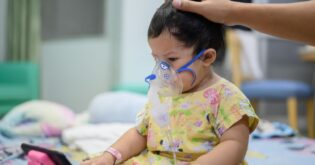How to Protect Yourself and Your Loved Ones from RSV
November 10, 2023 RSV, or respiratory syncytial virus, causes infections of the lungs and/or respiratory tract. The virus is quite a prevalent one; for example, the Mayo Clinic reports that most children have been infected with the virus by the time they are two. Children are not the only ones who can get sick with RSV – adults can also contract the virus. Although most adults and healthy, older children experience mild symptoms that mimic the common cold, infants and babies 12 months and younger, older people, individuals with heart and/or lung disease and those who are immunocompromised sometimes experience severe complications that require medical care and intensive treatment.
RSV, or respiratory syncytial virus, causes infections of the lungs and/or respiratory tract. The virus is quite a prevalent one; for example, the Mayo Clinic reports that most children have been infected with the virus by the time they are two. Children are not the only ones who can get sick with RSV – adults can also contract the virus. Although most adults and healthy, older children experience mild symptoms that mimic the common cold, infants and babies 12 months and younger, older people, individuals with heart and/or lung disease and those who are immunocompromised sometimes experience severe complications that require medical care and intensive treatment.
RSV Transmission
While nearly everyone knows about flu season, fewer people know about respiratory syncytial virus. Though people can fall ill with RSV year-round, the season usually begins in the fall and comes into full swing during the winter months. The Centers for Disease Control and Prevention (CDC) report that RSV is spread by:
- Droplets from an infected person’s coughs and/or sneezes getting into someone’s eyes, nose and/or mouth
- Coming into direct contact with the virus, like kissing the face of a child who has RSV
- Touching a surface that is contaminated with RSV, like a doorknob, and then touching your face or mouth before washing your hands
While most children will contract RSV before the age of two, people can experience repeated infections at any point in their lives. The CDC reports that while most individuals with RSV are contagious for a period between three and eight days, certain individuals (like some infants and those with weakened immune systems) can remain contagious even after they stop showing symptoms, for as long as four weeks. The virus can also survive on some hard surfaces – like tables and crib rails – for hours. Luckily, the virus survives for shorter time periods on soft surfaces like tissues and hands.
Common Signs and Symptoms
According to the CDC, people who are infected with RSV usually begin to show symptoms within four to six days of exposure. Some typical symptoms of the virus include:
- Runny nose
- Decrease in appetite
- Coughing
- Sneezing
- Fever
- Wheezing
Young infants with RSV may show specific symptoms such as irritability, decreased activity and/or difficulty breathing. If your child is having a hard time breathing, is dehydrated or their symptoms are getting worse, call a healthcare professional or visit your local emergency room.
Prevention Tips
The CDC recommends that some individuals receive immunizations to better safeguard them against contracting RSV. For example, the agency recommends adults aged 60 and above get the RSV vaccine – but only if they talk to their doctor first. The agency also recommends that all infants entering or born during RSV season receive an RSV-specific antibody that is given to babies. Some individuals should get the RSV vaccine during pregnancy, like those who are between 32 and 36 weeks pregnant between the months of September and January. To find out if you or your loved ones should receive an RSV vaccine or antigen, make an appointment with your healthcare professional.
For those who do not need to receive a vaccination, there are still a few everyday steps you can take to reduce your chances for contracting RSV. Check out the following prevention tips from the CDC:
- Stay home when you are sick or believe that you may be
- Cover your coughs and sneezes with a tissue or your shirt sleeve, not your hands
- Wash your hands often with soap and warm water for at least 20 seconds
- Avoid touching your face with unwashed hands
- Avoid close contact with others, like kissing, shaking hands, and sharing cups and/or eating utensils
- Clean all frequently touched surfaces like doorknobs and mobile phone devices
To learn more information about the respiratory syncytial virus, you can visit: https://www.cdc.gov/rsv/index.html. If you have a legal question or concern, someone at our firm can help. To learn more, contact a representative online now.
Philadelphia Personal Injury Lawyers at Galfand Berger, LLP, Representing Injured Victims Since 1947
If you have questions about filing a claim for injuries you sustained, contact the Philadelphia personal injury attorneys at Galfand Berger LLP today. Call us at 800-222-USWA (8792) or fill out our online form for a free consultation. Located in Philadelphia, Bethlehem, Lancaster, and Reading, we serve clients throughout New Jersey and Pennsylvania, including Allentown and Harrisburg.
 Google Screened
Google Screened
